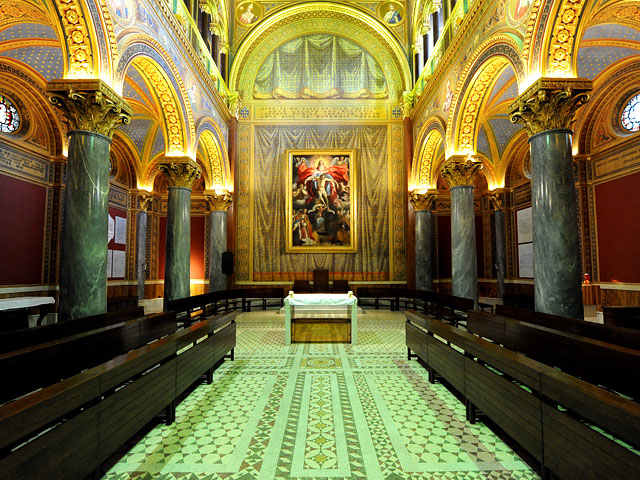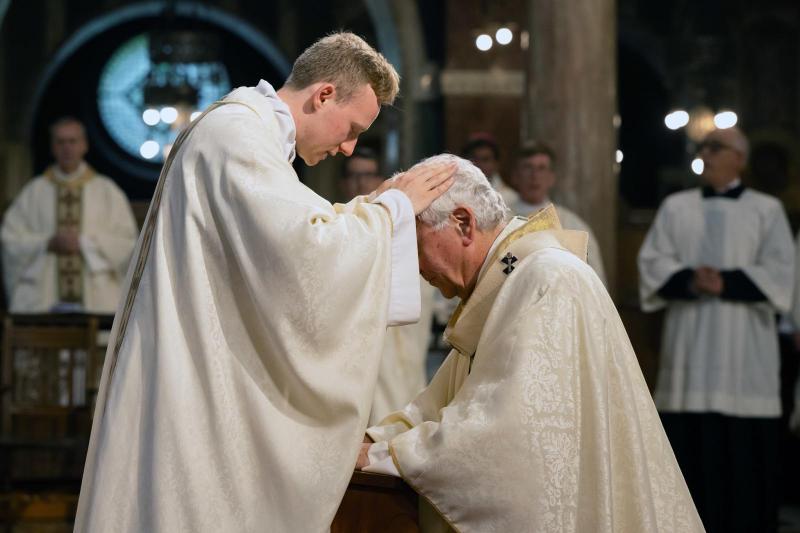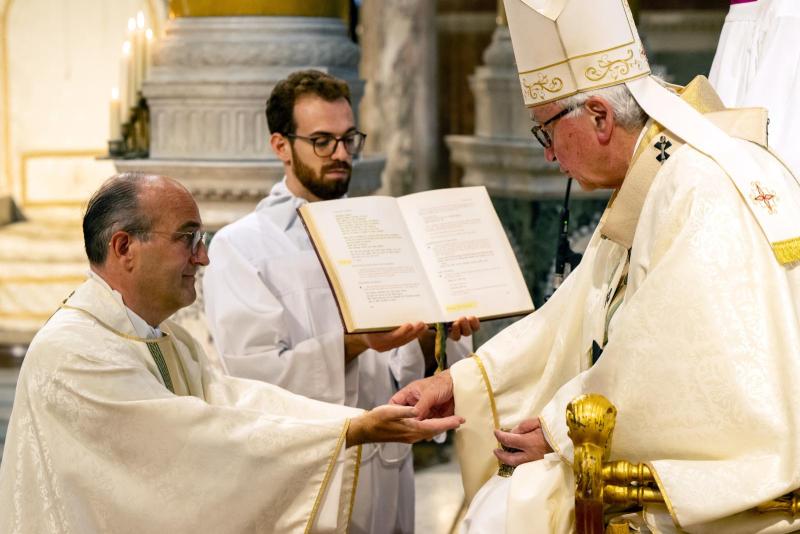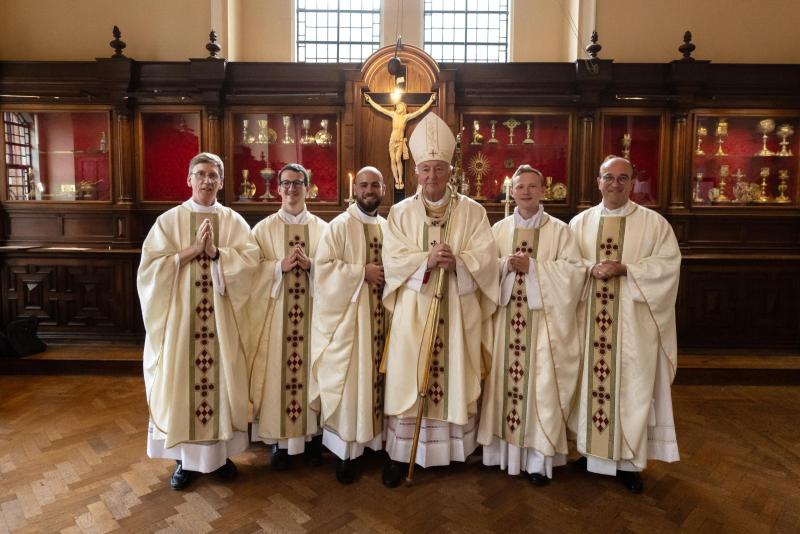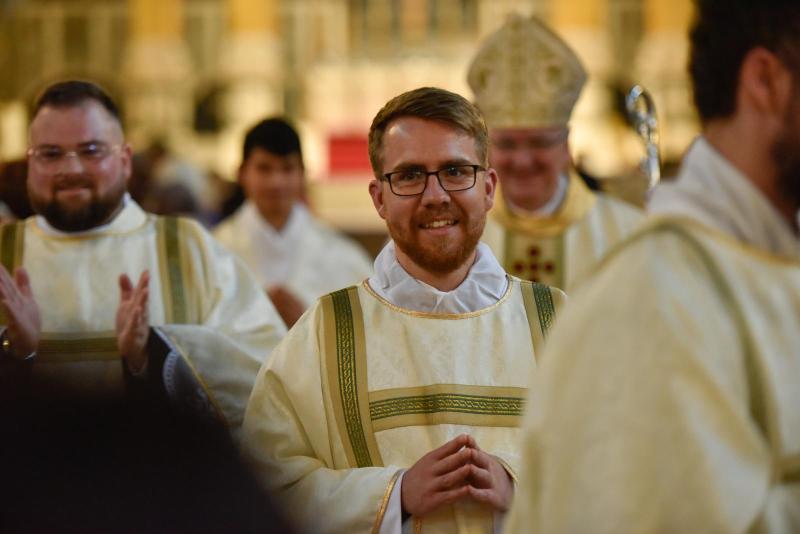Venerable English College Begins Year With New Rector
Monsignor Whitmore of Roman Curia Heads Formation of English, Welsh Seminarians
By Ann Schneible
ROME, October 11, 2013 (Zenit.org) - The Rome-based seminary for England and Wales has begun its academic year with a new rector.
Monsignor Philip Whitmore, from the Archdiocese of Westminster, was appointed to replace Monsignor Nicholas Hudson who has returned to the Archdiocese of Southwark, after having served as the rector of the Venerable English College (VEC) since 2004. Previously, Monsignor Whitmore had served in the Roman Curia, working first at the Congregation for Bishops and then at the Secretariat of State.
The VEC recently celebrated its 650th anniversary. It was originally established as a hostel for English and Welsh pilgrims to Rome. It was converted into a seminary in the late 1500s when it became illegal to study for the priesthood in England. During the Reformation, 44 of the VEC's former students were martyred for the Catholic faith after their return to England.
 At the start of the new academic year, Msgr. Whitmore sat down with ZENIT to speak about his new appointment.
At the start of the new academic year, Msgr. Whitmore sat down with ZENIT to speak about his new appointment.
ZENIT: What was your response upon learning you had been assigned as rector for the VEC?
Msgr. Whitmore: It was a surprise, really. I've been in the Roman Curia for 14 years. and sometimes when you've been in that world for so long, you can end up there for the rest of your life. I thought that, perhaps, my bishop might call me back to the diocese, but it hadn't occurred to me that the bishops would think of this, particularly as I've never worked in a seminary before. I'm completely new to the world of seminary formation; it's quite a challenge to be put in charge of a seminary after never having worked in one.
ZENIT: There has been somewhat of a rise in vocations over the last few years in the United Kingdom. What would you say has contributed to this?
Msgr. Whitmore: We have seen an increase in numbers compared to about 10 years ago when there were very few people arriving in the College. I've lived next door to the College for 14 years, so I've been able to observe it from a distance. It is true that our numbers have actually doubled in the last six or seven years.
Increasingly, I think, young people realize what a very, very different world the priesthood and the Church represent compared to the world of the culture of their contemporaries. Young people are attracted by a challenge that is really radical. We see that in religious life: it is particularly the enclosed communities with a strict rule of life that seem to attract vocations now. I think young people respond well to that kind of challenge.
Of course, we had the wonderful visit of Pope Benedict to our country, which did so much to inspire people, and lead them to want to follow Christ and to listen to the words of the Gospel, which he brought to life so effectively for us. And of course, the great excitement of having a new Pope, a new election, that's bound to be stimulating for young people, and it gives them a sense that there's growth here. There's life. There's a future.
ZENIT: What does a young man discerning a vocation to the priesthood need as part of his formation?
Msgr. Whitmore: They certainly have to learn to pray, they have to learn to model their lives on Christ in a very radical way -- daily prayer, daily reflection on the Scriptures -- and foster a great friendship with Christ, the person of Christ. Because their lives in the future are going to be so unpredictable, they really will have no securities beyond the security of knowing Christ and loving him, following him, and listening to his Word. They have to learn to put their own securities aside and rely entirely on him. And that isn't easy.
You say young men, and indeed they are; many of them are quite young, but not all. Some of them are in their 30s and 40s, and that brings an altogether different challenge because people have become used to having a certain number of securities in life. They have to be able to set them aside. Some of them had their own properties, and quite lucrative jobs, and have left them behind; now they are light as a feather, but they have to be able to lay new foundations. So, for all of them, whatever their time of life, there are those challenges.
Another great challenge is to be able to find the right words with which to speak the message of Christ, the message of the Gospel, in a world that really isn't used to thinking in those terms. In a culture that has become very Godless, very secular, very self-centered, they are proclaiming something very different. It's not easy to get that message across, so they have to work very hard on their preaching skills, their communications skills, so they can articulate the message that we have to offer.
ZENIT: At the moment we are in an era of a brand new pontificate. Over the years, some have cited John Paul II as having influenced their decision to pursue the priesthood or religious life. Others, Pope Benedict XVI. What does Pope Francis' pontificate have to offer men and women who may be discerning a vocation?
Msgr. Whitmore: There's a great simplicity about his message, and there are certain themes that come back again and again. They are themes that I think resonate very clearly with people today -- especially young people -- but actually with people of every generation. This emphasis on the great mercy of God, who is always ready to forgive and to move on, to receive, to welcome back the stray, God's infinite mercy is something he constantly underlines.
It seems to me that in any apostolic ministry -- in my own, and in the ministry of the priests that we're forming -- there has to be a balance between encouragement on the one hand -- it has to be very largely a message of encouragement -- but there also has to be challenge. Pope Francis is wonderfully encouraging when he speaks about the Lord's mercy, but he's also rather challenging when he speaks about the need to move away from worldliness. He has this very clear emphasis on poverty, by which he means an ability to stand aside from the attraction of riches and prestige, and be prepared to shun all that for the sake of loving the Lord and loving his people.
I think those two elements, which combine encouragement and challenge, are really very clear, and exactly what we need to hear today.
